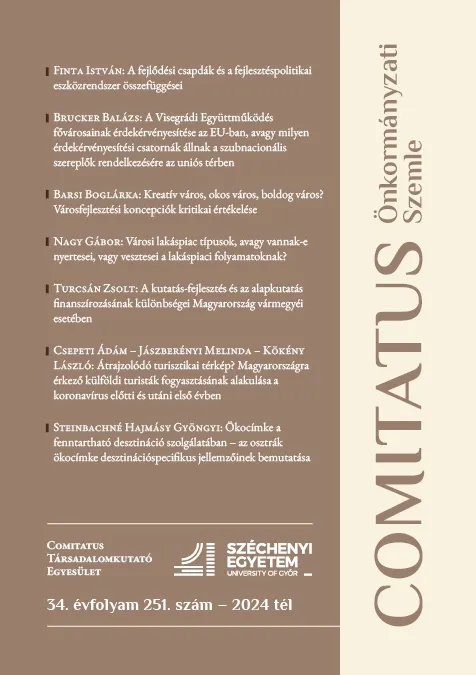Társadalmi egyenlőtlenségek hatása a területi különbségek kialakulására
The impact of social inequalities on the development of territorial disparities
| LETÖLTÉS | DOI: 10.59809/Comitatus.2023.33-246.93 |
|
Szerző: KÁPOSZTA JÓZSEF, egyetemi tanár, Magyar Agrár- és Élettudományi Egyetem, Vidékfejlesztés és Fenntartható Gazdaság Intézet, Vidék- és Területfejlesztési Tanszék, Gödöllő, kaposzta.jozsef##kukac##uni-mate.hu, ORCID: 0000-0002-1239-8541 SZEINER ZSUZSANNA, tanszékvezető, egyetemi adjunktus, Selye János Egyetem, Gazdaságtudományi és Informatika Kar, Közgazdaságtan Tanszék, Komárno, szeinerzs##kukac##ujs.sk, ORCID:0000-0003-3051-9674 |
Author: JÓZSEF KÁPOSZTA, professor, University of Agricultural and Life Sciences, Institute of Rural Development and Sustainable Economy, Department of Rural and Spatial Development, Gödöllő, kaposzta.jozsef##kukac##uni-mate.hu, ORCID: 0000-0002-1239-8541 ZSUZSANNA SZEINER, head of department, assistant professor, Selye Janos University, Faculty of Economics and Informatics, Department of Economics, Komárno, szeinerzs##kukac##ujs.sk, ORCID: 0000-0002-1239-8541 |
|
Kulcsszavak: egyenlőtlenség | területi különbség | társadalmi leszakadás | területfejlesztés JEL kód: R10, R11 |
Kulcsszavak: egyenlőtlenség | területi különbség | társadalmi leszakadás | területfejlesztés JEL kód: R10, R11 |
Absztrakt: Az egyenlőtlenség már régóta közöttünk élő jelenség, hiszen mind gazdasági, mind társadalmi, mind természeti tényezők együttesen befolyásolják kialakulását. Összekapcsolódó hatásain keresztül kialakulását komplex folyamatok övezik, amik eredményei hosszú távon befolyásolják az adott tér gazdaságának lehetséges fejlődési irányait. Ezen komplex tényezők miatt az egyenlőtlenségek területi dimenziójának vizsgálata egyre nagyobb jelentőséggel bír, hiszen az európai integráció legfőbb jövőbeli céljai között kiemelten jelentkezik a kiegyensúlyozott és fenntartható fejlődés kidolgozása. Ezen új tényezők vizsgálataival átfogóbb képet kaphatunk a területi fejlődés és az egyenlőtlenségek kapcsolatrendszerének lehetséges perspektíváiról. Jelen tanulmányban ezen új meghatározó tényezők és a területi egyenlőtlenségek kialakulásának összefüggés- és kapcsolatrendszere kerül vizsgálatra.
Abstract: Inequality has been with us for a long time, with economic, social and natural factors all having an impact. Through its interlinked effects, it is shaped by complex processes, the results of which have a long-term impact on the possible directions of economic development in a given area. These complex factors mean that the territorial dimension of inequalities is becoming increasingly important as the development of balanced and sustainable development is a key future objective of European integration. By examining these new factors, we can gain a more comprehensive picture of the possible prospects for the relationship between territorial development and inequalities. The present study examines the relationship between these new determinants and the development of territorial disparities.
IRODALOMJEGYZÉK
Atkinson, Anthony: Inequality: what can be done?, Harvard University Press, Cambridge, 2015. https://doi.org/10.1017/s1537592716000451
Barro, Robert – X. Sala-i, Martin: Convergence Across States and Regions, Brookings Papers on Economic Activity, 1991/1, 107–182. https://doi.org/10.2307/2534639
Bhir, Alain – Pfefferkorn R: Le system des Inégalités, La Découverte, Paris, 2008.
Boldrin, Michele – Canova, Fabio: Regional Economic Convergence: Is European Regional Policy Worth Keeping?, in: Hagen, Jürgen von – Widgren, Mika (eds): Regionalism in Europe, ZEI Studies in European Economics and Law, 2001/4. https://doi.org/10.1007/978-1-4615-1643-9_4
Bourdieu, Pierre: A Distinçăo: uma crítica social da faculdade de juízo, Ediçőes 70, Lisbon, 2010.
Cantante, Frederico: O Risco da Desigualdade, Almedina, Coimbra, 2019.
Cappelen, Adne – Castellaci, Fulvio – Fagerberg, Jan – Verspagen, Bart: The impact of EU regional support on growth and convergence in the European Union, Journal of Common Market Studies, 2003/41, 621–644. https://doi.org/10.1111/1468-5965.00438
Costa, Antonio Firmino: Desigualdades Sociais Contemporâneas, Mundos Sociais, Lisbon, 2012.
Dalton, Hugh: The Measurement of the Inequality of Incomes, Economic Journal, 1920/30, 348–361. https://doi.org/10.2307/2223525
Desmet, Klaus: A simple dynamic model of uneven development and overtaking, The Economic Journal, 2002/112, 894–918. https://doi.org/10.1111/1468-0297.00071
Faragó László: Társadalmi-területi egyenlőtlenségek, Tér és Társadalom, 2016/3. https://doi.org/10.17649/tet.30.3.2803
Faragó László: Autopoietikus (társadalmi) terek koncepciója, Tér és Társadalom, 2017/1, 7–29.
https://doi.org/10.17649/tet.31.1.2839
Faragó László: A tér semmi és minden, in: Faragó, László (szerk.): Kortárs térelméletek kelet-közép-európai kontextusban, Dialóg Campus Kiadó, Budapest, 2018, 309–321, 397.
Faragó László: A Modern Városok Program, mint fejlesztéspolitikai rezsim helye a magyar területfejlesztési politikában, Tér-Gazdaság-Ember, 2019a/2-3, 181–203.
Faragó László: Téri lét: Társadalmi fordulat a térelméletben, Dialóg Campus Kiadó, Budapest, 2019(b), 240.
Fernandez, Raquel – Rogerson, Richard: Income Distribution, Communities and the Quality of Public Education, The Quarterly Journal of Economics, 1996/1, 135–164. https://doi.org/10.2307/2946660
Lessmann, Christian: Fiscal decentralization and regional disparitiy, Evidence from cross-section and panel data, Environment and Planning A, 2009/10. https://doi.org/10.1068/a41296
Massey, Doreen: World city, Polity Press, Cambridge, 2007.
Milanovic, Branko: Global income inequality by the numbers: in history and now -an overview,
World Bank Policy Research Working Paper, 2012/6259, 1–28. https://doi.org/10.1596/1813-9450-6259
Piketty, Thomas: Capital and ideology, Cambridge, Belknap, 2020. https://doi.org/10.4159/9780674245075
Shevky, Eshref – Bell, Wendell: Social area analysis: theory, illustrative application and computational procedures, Stanford University Press, 1955.
Shi, Qiujie – Dorling, Danny: Growing socio-spatial inequality in neo-liberal times?, Comparing Beijing and London, Applied Geography 2020, 115:102139. https://doi.org/10.1016/j.apgeog.2019.102139
Therborn, Göran: The killing fields of inequality, Polity Press, Cambridge, 2013. https://doi.org/10.1017/s0047279414000476
Therborn, Göran (ed): Inequalities of the world new theoretical frameworks: multiple empirical approaches. Verso, London, 2006.
Tilly, Charles: Historical perspectives on inequality, in: Romero, Mary – Margolis, Eric (eds.): The Blackwell Companion to Social Inequalities, Blackwell, Malden, 2005, 15–30.https://doi.org/10.1002/9780470996973.ch2
Wilkinson, Richard – Pickett, Kate: The spirit level. Why more equal societies almost always do better, Allen Lane, London, 2009.
Wooldridge, Jeffrey M.: Econometric Analysis of Cross Section and Panel Data, MA: MIT Press, Cambridge, 2002.
Wright, Erik Olin: Análises de classes, história e emancipaçăo, Revista Crítica de Cięncias Sociais, 1994/40, 3–35.


